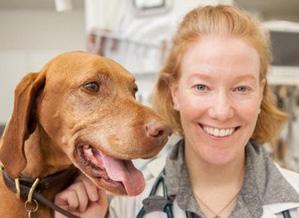
2 minute read
Pet Project
Hot Dog: Cooling Down Hot Spots
By Amy Marie Orozco
Advertisement
The highs of sharing life with a dog are many. Fortunately, the lows are few. Nonexistent some may say. If your canine could talk, maybe they’d say, “Hot spots are the lowest of the lows.” Chronic and incurable, hot spots, sometimes called the Santa Barbara Itch, are red, irritated, and painful areas of a dog’s skin. They can appear anywhere on a canine’s body and are common on the feet, tail, and behind.
If your pup continually chews or licks a localized patch of skin, chances are there is a hot spot. Though they can’t be cured, they can be managed for a better quality of life. Management is a multi-pronged approach, according to Dr. Eileen Gillen, DVM, who splits her time between a canine rehab and acupuncture practice and shifts as an emergency room veterinarian at Central Coast Veterinary Group in Arroyo Grande.
She discovered cannabis can serve as one prong of that approach and now creates custom-made CBD treats to help dogs. Like many discoveries, hers was unexpected. After medical marijuana was legalized in California, people would bring their dogs, who had signs of THC exposure, to the emergency room. Oftentimes, the pet had gotten into an owner’s edibles or eaten some buds. The dogs would be fine. Later, the veterinarian remembers, owners would telephone to say their pet was doing great. Maybe one with arthritis would be moving with more ease or another’s scratching lessened. This inspired her to begin her own research on the medical properties of cannabis. Remember, evidence-based (versus anecdotal-based) research of cannabis, is relatively new due to its illegal status and demonization.
Though death by THC intoxication is rare in dogs, it can cause severe respiratory depression. Canines have many more THC receptors, concentrated near the brain stem, than humans. THC toxicity is easier to manage in dogs, though, than raisins, grapes, or strychnine, according to Dr. Gillen.
Like any remedy, the dosage of plant medicine is very important, and it goes for dogs as well as for humans to go slow. Generally speaking, a good starting point is 0.25mg to 0.55mg of medicine per 1 kilogram of dog. The method can be topical, oral, or something else. Reminder: It goes without saying that it is best to consult with your veterinarian about a cannabis regimen for Fido. Researching on your own will benefit your pet, too.
Cannabis may not work with some dogs.; it’s all very individual. Other ways to manage hot spots include modifying diet, switching shampoos, monthly injections, and over-thecounter creams, which can be hit or miss. Keep the area clean, clipping the fur may be necessary and sometimes the cone of shame may have to be utilized.
Cooling down your dog’s hot spots may take time. Your best friend, however, is worth the investment.

Dr. Eileen Gillen, DVM and Viszla "Bender"
Courtesy Photo
Dr. Eileen Gillen, DVM, may be reached at egillen@aol.com.










